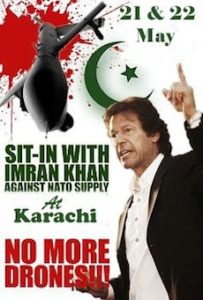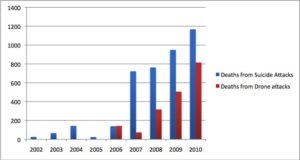Hiding Behind the Drones

Down with the drones: Imran Khan has waged a war against drone attacks, and it seems to be resonating with Pakistani citizens.
Imran Khan promises to free Pakistan of injustice, poverty, homelessness, illiteracy and unemployment while empowering women and securing equal rights for religious minorities. But Khan’s critics label him a Taliban sympathiser who garners support by using the anti-US card when anti-US sentiments already are high. Whereas Khan staunchly opposes the drone strikes in Pakistan and repeatedly blames them for rising terrorism in the country, critics feel he has not been vocal enough in condemning religious fanatics across Pakistan. And while he has not protested against suicide attacks on the civilian population, he is on his way to lead a second sit-in against CIA-operated Predator drones, this time in the country’s financial capital, Karachi. His claim: the menace of terrorism (which the US claims the drones contain) can be uprooted within 90 days under his leadership if the drones stopped raining ‘hellfire.’
Is the US really the reason for growing terrorism in Pakistani society? Are drones targeting innocent civilians? Would terrorism be contained if the drones were to stop?
Drone attacks began in 2004. Only nine strikes occurred in the first four years of the program. Since January of 2008, however, there have been over 230 incidents of drone attacks in Pakistan’s north. But the history of terrorism in Pakistan precedes these events by decades.
From the 1986 Pan Am hijacking in Karachi to the 2008 Mumbai attacks, Pakistan has been implicated in many acts of global terrorism. Even foreigners have found Pakistan a fertile haven for terror. As such, many international terrorists in recent history have been proven to either have trained in Pakistan or been arrested on its soil. Here are a few of those names: Waleed bin Attash of Yemen who killed 17 people in the 2000 USS Cole attack; Ahmed Ghailani of Tanzania who was responsible for the death of over 200 people in the twin US embassy attacks in Kenya and Tanzania; Khalid Sheikh Mohammad of Kuwait who masterminded the 9/11 tragedy; Umar Patek of Indonesia who killed hundreds in Bali; senior Al-Qaeda operative Abu Faraj al-Libbi of Libya; and now Saudi-born Osama bin Laden.
Drone attacks motivated none of these people or events. The underlying sentiment was hatred of the West and US foreign policy elsewhere in the Arab and Muslim world, as well as a strong desire to cause harm. It was also the extremist belief that non-Muslim countries are Dar-ul-Harb and the world should be in a constant state of war until the domination of Islam. Even though Islam forbids suicide, some radical influential scholars have justified suicide bombings to meet this end. These suicide attacks, which Imran Khan believes are the result of drone attacks, had been sanctioned by extremist clerics in Pakistan much before the drones visited us.
As shown in the graph below, not only can we not deduce a cause-effect relationship between drones and suicide bombings, we can clearly see that the latter have been far more deadly. (Text continues after the graphic).

Is there a link? The number of deaths in Pakistan caused by suicide blasts and those due to drone attacks, from 2002-2010. Sources: The New America Foundation, CPOST and the South Asia Terrorism Portal.
With an escalation of the war on terror, suicide bombings have risen but the real motivation for these attacks remains a radical interpretation of faith and the prevailing anti-American sentiment. And while drone attacks may have contributed to rising anti-US sentiment in some quarters, they alone do not represent the entire source of anger towards the superpower. Besides, it is safe to say that some political parties have used drone attacks to stir up anti-US sentiment to use as a weapon against the sitting PPP government.
Further, we cannot ignore the fact that hundreds of madrassas in the south of Punjab and in other parts of the country continuously indoctrinate children in this ideology, even recruiting them to become suicide bombers, promising paradise as the reward. Nor can we ignore that a spike in suicide attacks occurred in 2007 after the military operation at Lal Masjid in Islamabad — an operation that was carried out by Pakistani forces not US forces.
In Jihad in Islam, Maulana Abul Ala Maududi writes, “Islam wishes to destroy all states and governments anywhere on the face of the earth which are opposed to the ideology and program of Islam, regardless of the country or the nation which rules it.” Fanatics take inspiration from such passages. Multiple terrorist outfits operating in the country also claim to find support for their actions in distorted interpretations of Islam. Lashkar-e-Taiba, the SSP, Lashkar-e-Jhangvi, Jaish-e-Muhammad and many more have been active for decades in Pakistan spreading violence within the country and exporting it abroad. Extremist ideology continues to be preached in seminaries such as the Darul Uloom Haqqania (aka the “University of Jihad”), the same seminary Imran Khan visited for support on his way to a sit-in in Peshawar a few days ago. The senior vice-president of Khan’s Pakistan Tehreek-e-Insaf was also recently seen with Hafiz Saeed, the head of Jamaat-ud-Dawaa, the political and charitable arm of the banned LeT, condemning Osama’s murder. Osama was named a “Martyr of Islam” in the same rally.
Imran Khan does condemn all forms of terror, but why does he fail to protest against these terrorist organisations and against their distorted teachings with the same vigour he employs when railing against US drones? And, ironically, why does he instead seek support from them? Where were the sit-ins against the ideology that led to the assassination of Salmaan Taseer or Shahbaz Bhatti? What if there were no drone attacks, would Taseer and Bhatti have been saved? Would the thousands that celebrated their death and forbade prayers at their death suddenly have become champions of interfaith harmony and preachers of pacifism? Would stopping drone attacks and fighting the war on our own stop extremism?
The destruction from drones, as opposed to the thousands that have died at the hands of the militants, is considerably less. According to the New America Foundation, drones have killed a high estimate of 2,350 people, 1,880 being militants. Thirty-three of those were militant leaders. According to the Long War Journal, 1,879 leaders and operatives from Taliban, Al Qaeda and allied extremist groups have so far been killed with 138 civilian casualties. So, while not trivialising the tragic deaths of civilians, drone attacks have helped to eliminate hundreds of terrorists and prevent them from further tarnishing the image of Pakistan and Islam.
The Aryana Institute for Regional Research and Advocacy (AIRRA) interviewed locals from the areas hit by drone missiles. Their results showed that most locals saw the drones as liberators from the militants operating in the area. Farhat Taj, a member of AIRRA, challenged American and Pakistani media to provide verifiable evidence of their exaggerated claims of civilian casualties and argued that since the areas were inaccessible to the government and media, the Taliban exaggerated numbers as part of a propaganda war to win the hearts of the citizens. Her challenge remains to be taken up.
Contrary to the surgical strikes of the drones, military combat on the ground has caused a higher percentage of civilian casualties. Moreover, the drones that fly over Pakistani airspace once took off from Shamsi Air Base in Balochistan (though, there are reports that most now depart from Jalalabad, Afghanistan). As such, it would be more appropriate for Imran Khan to shift the sit-in to the GHQ headquarters in Rawalpindi. It would be even more appropriate to shift them to Jamia Haqqania, or Mansoora for that matter, places that have long endorsed extremism and spread it around the country.
Imran Khan claims he can end the decades-long menace of terrorism by bringing an end to drone attacks. To that, I respond: if the aim of your sit-in really is to end terrorism and not just garner political support, Mr Khan, then I suggest a shift in site… that’s all.
Vote in the poll below:
[poll id=”18″]



